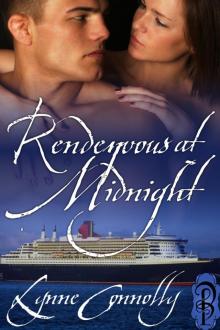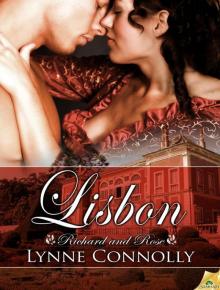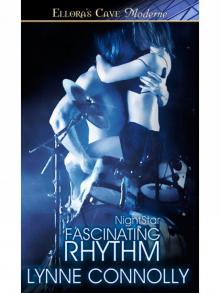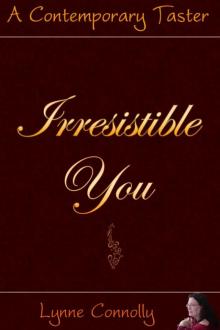- Home
- Lynne Connolly
Arrows of Desire: Even Gods Fall in Love, Book 3
Arrows of Desire: Even Gods Fall in Love, Book 3 Read online
When the God of Love falls for a nymph, all seven hells break loose.
Even Gods Fall in Love, Book 3
Finished with the tutoring that taught him how to be an immortal, Edmund, otherwise known as Eros, steps off the packet onto English shores, and stumbles head over heels in love.
There’s something different about Perdita Seaton and her secretive family, but for now a bigger dilemma looms. Revealing he’s the Duke of Kentmere could cut their courtship short. Yet abandoning his heritage means leaving his beloved sister at the mercy of the Titans.
Even as Edmund steals Perdita’s breath with the speed at which he sweeps her down the aisle, she feels safe in the irresistible tide of passion. Her father, head of a smuggling empire, is Oceanus—and she is a nymph.
Disaster strikes when Edmund races to London to rescue his sister, and doesn’t return. Desperate, Perdita follows him, only to find no light of recognition in his eyes.
Now she must choose. Admit defeat, or fight to break the enchantment keeping Edmund’s heart prisoner—and risk the wrath of a jealous goddess who’d be all too happy to snuff her out.
Warning: Contains a wedding night that transcends heaven, a mother-in-law from hell, and one Titanic case of amnesia.
Arrows of Desire
Lynne Connolly
Chapter One
Being a duke was good, but being a god was better.
Since Edmund had left England, he’d learned so much. He’d learned how to be a god, as well as a duke. And for that, he owned his mentor a huge favour. Edmund, Duke of Kentmere, who also held the attributes of Eros, gazed out of the window on to the green vista of the estate of the Duchesse de Clermont-Ferrand and smiled. The duchesse entered with a typical swish of silk and crossed the room to him, laying her hand on his shoulder. “You seem pensive,” she said, her musical tones as seductive as her hidden identity. The duchesse was Venus, goddess of love. And he was Cupid, or as he preferred, Eros.
He hadn’t even known that much when he left England. “I’m wondering if it’s time to return home,” he said. “My sister is mortal, don’t forget. My mother shows no indication of hurting her, but I worry sometimes.”
She kissed his forehead, the gesture one of friendship rather than lover-like. “You should write to her. You are almost ready to face her. But you know there is something I want from you. It’s a small thing.”
“Yes.” Although he and the duchesse were of an age, their relationship was more mentor and pupil than of equals. While his mother had kept him ignorant of his true potential, the duchesse had known from an early age that she was the personification of Venus, and she had learned her power and how to wield it.
He’d been lucky to find her. Now what she wanted seemed entirely reasonable.
She wanted him to marry her foster daughter, Suadela, known to the outside world as Susanna. While the duchesse was English, she’d been living in France since her marriage at the age of eighteen to the aged Duc de Clermont-Ferrand and she’d adopted much of the pragmatism of the French. Love played little part in any marriage, but a union with Susanna would cement the union between them and give Susanna a certain future.
“The contract is only a declaration of intent, yes?” Edmund asked.
“Yes. A favour.”
“I may find different circumstances when I arrive in Britain.” His main family holdings were in Scotland, but he planned to make a few stops on the way, to visit people in London and his smaller properties. It was time he surveyed his possessions.
The duchesse shrugged. Never had a shrug appeared more elegant. “Then we will renegotiate.”
“I’ll sign the contract,” he said.
She strolled to the gilded and inlaid bureau by the window and opened a drawer, pulling out the papers. He might have known she’d have it ready. He’d already perused the terms and had a man of business go over it, so he knew the contents well enough to pick up a pen from the standish and sign the papers with his customary flourish.
Susanna was lovely and spirited. She’d make an excellent Duchess of Kentmere.
“You won’t regret it,” she said.
He smiled, wondering why he felt no different. “I know.”
But he would not go to England with all pomp due a duke. He’d find a place like this one, somewhere he could use as a base, independent of his ducal holdings. A private place.
A week after his discussion with the duchesse, Edmund staggered down the narrow gangway of the ship with a profound sense of relief. The crossing to Dover from France was never calm. At this time of the year, when February was turning into March, it had proved a sore trial. The wind had whipped up out of nowhere and caused him a great deal of discomfort. It buffeted him now, but with his feet on ground that didn’t shift under him, he could bear it. He gulped down lungfuls of fresh air. He wanted nothing more than to get to the inn and settle in for the night.
When a cry of “Your grace!” came from behind him, Edmund suppressed his sigh of resignation. He turned around, forcing a smile to his face, ignoring the people who inevitably stared at him.
“Do you stay in Dover tonight?” his tormentor asked.
Not for the first time Edmund wished he was truly plain Mr. Welles and not the Duke of Kentmere. Or that his factotum hadn’t made the error of addressing him as “your grace” in this man’s hearing.
“I travel on,” he lied, praying Mr. Inglis wasn’t staying. For sure if Inglis learned Edmund planned to stay here overnight, Edmund would never shake the man off.
Inglis adjusted the folds of his crumpled neckcloth. Edmund had given up and removed his. He’d felt much better for it, replacing it loosely just before they were due to land, or dock, or whatever the confounded term was.
Edmund’s valet walked down the gangplank, holding Edmund’s valise. Edmund glanced at Lightfoot and sent him a mind-to-mind warning message. Don’t tell this toady I’m staying in Dover tonight.
He received a respectful note of acquiescence in his mind. Damn, but having an Ancient as a valet was useful. “The carriage will be waiting, your grace,” Lightfoot said, easing his lanky form around Inglis without actually touching him. Edmund could not emulate that art.
He sucked in more air. Why people said sea air was beneficial defeated him. It stank of fish and guano. Today he wanted to regain his land legs and sleep. Dover was possessed of a number of comfortable inns. It would be a shame not to take advantage of one.
Inglis’s mouth turned down at the corners, like a schoolboy deprived of a treat. “Ah, then we must say farewell. Or au revoir, as our French friends say.”
Edmund tried not to appear happy at the prospect. He nodded. “Have a good journey.”
“And you, sir. I am travelling by the stage which leaves the Crown in Biggin Street at noon.”
He glanced at Edmund hopefully, but Edmund didn’t oblige with a reply. Obviously the man was angling for a seat in his carriage. Even if he was prepared to leave today, sharing a carriage with the obsequious man even for ten miles would make his queasiness much worse. London was eighty miles away. He’d commit murder if he had to share a small space with the man who had done nothing but toady to him since he’d discovered Edmund’s status.
So, with a few meaningless words, Edmund saw Inglis on his way with absolutely no regret at all. Rather, a sense of profound relief filled him.
“There is only one problem, sir,” Lightfoot murmured. “I have booked rooms at the Crown. Although it’s a busy inn, it has an excellent reputation. I could loo
k for another inn, but I cannot guarantee as good a room.”
Edmund groaned. “No, leave it as it is. How long do we have to kick our heels in Dover before the stage leaves?”
“An hour and a half, sir.”
“Shall we find another inn and take some refreshment?”
“That would be advisable, sir.”
After finding an acceptable establishment and ordering coffee, Edmund fidgeted on the hard wooden seat. He didn’t want to sit still anymore. He’d been journeying for nigh on a week, and he was so close to London, he wanted to press on. Being an immortal gave him some advantages, but flying wasn’t one of them, not for him at any rate. He still had much to learn, thanks to his damned mother keeping so much from him for so long.
He’d come home privately in order to set up a place where he could feel safe and take action against his mother, if need be. Inglis had nearly wrecked that, aided and abetted by Lightfoot’s one “your grace,” uttered on the dock as they were climbing aboard the packet.
He took a reflective sip from the excellent coffee they served here, gazing out of the window of the inn. This must be a fashionable area, because several ladies and their attendants were walking along the thoroughfare. They were all dressed well, if not as extravagantly as in London or Edinburgh.
He straightened when a trio of young ladies passed by. They were strolling along at their leisure, chatting and giggling. A footman staggered behind them under the weight of several boxes. By the appearance of some of the packages, three broad, circular hatboxes, they’d been to the milliner’s. All three were pretty, and he discerned a family resemblance. They were of a height, their build was similar and they had a way about them, a familiarity in the way they glanced at each other and smiled, sharing a private joke.
For the first time since Edmund’s arrival here, he relaxed and appreciated the sight of a trio of pretty women enjoying a shopping trip.
A shot of recognition shocked him into awareness. His mentor had taught him to listen to his mind, to what his sleeping self was telling him. Previous to his trip abroad he’d have ignored the feeling. Now all his senses concentrated on the source. Undoubtedly the women who’d just strolled past.
His attention turned to his valet, who said nothing, but nodded. Edmund put down his coffee. “Immortals,” he murmured.
As Edmund’s attention returned to the street outside, the footman dropped a small package but appeared not to notice. Fortunate happenstance, as far as Edmund was concerned. Edmund got to his feet. “My cue, I think.”
“Sir.”
When Lightfoot made to rise, Edmund waved him back. “Let me get the lay of the land first. I’ll contact you if I need you.”
Grabbing his cocked hat and cramming it on his head, Edmund left the inn at a fast pace, before someone else could retrieve the package.
He bent and swept up the brown paper-wrapped bundle. Something hard lay inside. A box. No matter. That wasn’t where the sense of awareness came from. He found it difficult to describe, like a fine needle touching a nerve, but the sense told him there were immortals about.
The young ladies had nearly gained the end of the street. Increasing his pace, he reached them before they turned the corner. They were obviously used to a country pace, brisker than a town saunter, even though they wore fashionable town dress. It didn’t slow them down. Edmund admired a woman who could set a good pace and handle a hooped petticoat with aplomb. These ladies were prime examples.
He stood before them and performed a good bow. Not a Versailles flourish, but one a man might give a duchess in Bond Street in London. Flattering but not overwhelming. Best to keep something in reserve. He rose gracefully and held out his hand, the package resting on his palm.
“I beg your pardon, ladies, for approaching you in such a manner, but I believe your man dropped this.”
Lifting his gaze, he met three very pretty faces and three pairs of blue eyes.
The turquoise pair owned by the beautiful lady in the middle transfixed him. She stared at him, her mouth rounded in a sweet, inviting O. Then and there, Edmund decided he was travelling no further tonight, or for some foreseeable time.
The sense of immortals had increased to the level where he no longer had any doubt he was facing at least one. More than that—he wanted this woman. His libido screamed into life.
The gentleman—for he had to be a gentleman, so well was he dressed, if a little dusty—was the most beautiful Portia had ever seen. Maybe not the right word, but that was what had filled her mind when she first looked at him. Beautiful. As if she heard him.
Which was ridiculous, because she could only hear her family in her head.
Besides, she was right, although elegant or austerely handsome worked too. His cheekbones were sharp enough to cut paper, his lips, currently curved in a smile, positively sculpted. Unlike her greenish-blue eyes, his mirrored a cloudy sky on a spring day.
Goodness, she was getting far too poetic.
He was gazing at her as if she was the only woman in the world. It was completely seductive, to give her so much attention.
While she was trying to regain her senses, her sister Anthea spoke. “Why, thank you sir. I believe you have saved our skins! That package contains a peace offering for our father, for we may have overspent a little. How could we resist when we discovered a new milliner?”
Anthea laughed, and Portia sent her silent thanks to whoever was watching over them. Her sister’s gift for babbling had given her a chance to recover from her temporary numbness. No man had ever evoked that response in her before. Who’d have thought she was so gauche?
The man took his attention away from her and to Anthea. The smile still on his lips, he inclined his head. “It’s my pleasure, ma’am.” He closed his hand over the small package. “You must allow me to help you. I beg your indulgence, but as yet I know nobody in Dover, so I’m unable to ask for an introduction. I am perfectly respectable, I assure you.”
“Are you planning to stay here, sir?” Anthea could get away with murder with her artless questions. Men frequently took her for an empty-headed fool, and by the time they discovered she was nothing of the kind, she’d obtained all the information she wanted.
Portia had assumed he was a passing traveller. The coaching inns were generally full and the customers didn’t remain there long. She glanced over the man’s head to the distant sight of ship’s masts in the busy harbour and the castle, its solid magnificence looming over everything. Sights she took for granted most days. Perhaps a ship had brought him, or maybe one of the elegant equipages tooling along Biggin Street. Whatever it was, she’d like to ensure he wouldn’t be getting on it again in a hurry. She yearned to know more about this man, the longing surprising her with its intensity. At the moment she didn’t even know his name.
As if he heard her, he swept into another bow. “My name is Edmund Welles and I’ve recently returned home from abroad. I’m fancy-free and I like what I’ve seen of this part of the country. I thought to buy a house in the district and settle for a while. I can only consider myself fortunate to have met some local residents.” He gave a wry smile. “I should not keep you.” He opened his hand again. “I should restore this to you and be on your way.”
“There’s a dance at the assembly rooms this Thursday,” Portia blurted. Damn, now he’d think she was as idiotic as her sister. In her experience, men worth knowing preferred women who had at least a modicum of intelligence. She shifted on the cobbles, her sturdily clad feet not quite blocking the cold emanating from the stone. “It’s a general assembly and most of the locals attend, as well as a few visitors.”
Millicent held out her hand, smiling politely. “I’m Mrs. Millicent Wright and these are my sisters, Anthea and Portia Seaton. Our father is Sir Mortimer Seaton of Seaton Hall. You should address yourself to him. I’m sure he’d be delighted to meet you.”
“I
am honoured.” While it was forward of him to approach them, he’d made the most of his opportunity. None of the sisters took the package from him. If they did, then he’d have no more excuse to stay with them.
He touched his fingers to his hat. “Are you on your way home?” He glanced up to the grey sky. “Indeed, the weather may be inclement and I’d seriously consider it. Do you have far to go?”
“Five miles, no more,” Anthea said. “Our carriage is at the end of the street, stationed at the King’s Head.”
“Then allow me to escort you there. The packet from France has not long disgorged its passengers, and you may find yourselves inappropriately approached.” His eyes twinkled, as if to dare them to challenge him for being inappropriate.
“Oh, we’re used to it, sir.” Anthea waved a gloved hand. How she kept her gloves so pristine over the course of a whole day, Portia never knew. She always ended a shopping trip with dusty marks on her fingertips. “We can take care of ourselves.”
“You should not have to.” His smile faded, replaced by concern, the corners of his eyes creasing into fine lines, the irises darkening. “I would count it a special privilege if you’d allow me to escort you safely to the inn.”
Slick. Maybe too much so. Charlatans had that kind of address. As he fell in by Millicent, Portia caught sight of the ghost of a smile on his lips. It was so faint she couldn’t be sure she’d actually seen it.
“When did you make the decision to move here, sir?” she asked.
He glanced at her, and the smile returned properly. “When I had the chance to see some of the sights in the district. It is charming and far too good not to study.”
“You do not have a family home?”
A shadow crossed his eyes. It melted away almost as soon as she noticed it. “A small one. I have a desire to buy a house of my own. Family houses are somewhat oppressive at times, don’t you agree?”
She longed to ask Mr. Welles what he did and how he had the money to spare for such a house, but to ask was unpardonable. Was he socially acceptable for them to meet? Oh, he had excellent address and his confidence spoke of a man with a position in society, but many upstarts could behave the same way. And others, yeomen, tradesmen, for instance. For herself she’d be happy wherever she found friends, but her mother was a stickler for correct form. It wasn’t fair. Her father consorted with whomever he chose and nobody condemned him for it. However, his daughters must limit their acquaintances to those their mother deemed appropriate.

 Boundless (The Shaws)
Boundless (The Shaws) Sinless (The Shaws)
Sinless (The Shaws) The Girl with the Pearl Pin
The Girl with the Pearl Pin Hosts to Ghosts Box Set
Hosts to Ghosts Box Set The Making of a Marquess
The Making of a Marquess Boundless
Boundless Beauty of Sunset
Beauty of Sunset Virginia And The Wolf
Virginia And The Wolf Department 57: Bloody Crystal
Department 57: Bloody Crystal Temptation Has Green Eyes
Temptation Has Green Eyes Forged by Love: Even Gods Fall in Love, Book 4
Forged by Love: Even Gods Fall in Love, Book 4 IntheMood
IntheMood Hareton Hall: Richard and Rose, Book 6
Hareton Hall: Richard and Rose, Book 6 ShiftingHeat
ShiftingHeat Rendezvous at Midnight
Rendezvous at Midnight Yorkshire: Richard and Rose, Book 1
Yorkshire: Richard and Rose, Book 1 Lisbon: Richard and Rose, Book 8
Lisbon: Richard and Rose, Book 8 Devonshire: Richard and Rose, Book 2
Devonshire: Richard and Rose, Book 2 Venice
Venice War Chest: Even Gods Fall in Love, Book 5
War Chest: Even Gods Fall in Love, Book 5 Dilemma in Yellow Silk (Emperors of London)
Dilemma in Yellow Silk (Emperors of London) BornontheBayou
BornontheBayou Dauntless (The Shaws)
Dauntless (The Shaws) Brutally Beautiful
Brutally Beautiful Lightning Unbound: Even Gods Fall in Love, Book 1
Lightning Unbound: Even Gods Fall in Love, Book 1 FascinatingRhythm
FascinatingRhythm Fearless
Fearless A Chance to Dream
A Chance to Dream Mad for Love: Even Gods Fall in Love, Book 2
Mad for Love: Even Gods Fall in Love, Book 2 Sinless
Sinless SailtotheMoon
SailtotheMoon Wild Lavender
Wild Lavender Department 57: Rubies of Fire
Department 57: Rubies of Fire Maiden Lane
Maiden Lane Harley Street
Harley Street Dauntless
Dauntless NicenEasy
NicenEasy It Started at Waterloo
It Started at Waterloo Temporary Spy
Temporary Spy BorntobeWild
BorntobeWild Dilemma in Yellow Silk
Dilemma in Yellow Silk Yorkshire
Yorkshire The Thorndykes 1: Dispossessed
The Thorndykes 1: Dispossessed The Thorndyke Trilogy 2: Dancing at Midnight
The Thorndyke Trilogy 2: Dancing at Midnight Learning to Trust
Learning to Trust Her Quicksilver Lover: Even Gods Fall in Love, Book 6
Her Quicksilver Lover: Even Gods Fall in Love, Book 6 Loving Lucy
Loving Lucy Irresistible You
Irresistible You Arrows of Desire: Even Gods Fall in Love, Book 3
Arrows of Desire: Even Gods Fall in Love, Book 3 Unbroken
Unbroken Devonshire
Devonshire Reckless in Pink
Reckless in Pink Rogue in Red Velvet
Rogue in Red Velvet